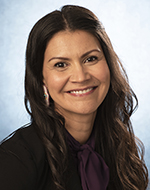Page Content
 Check your resources. That’s the lesson to be learned after an insensitive question about residential schools came to light via social media, says Melissa Purcell, an executive staff officer who oversees Indigenous programming at the Alberta Teachers’ Association.
Check your resources. That’s the lesson to be learned after an insensitive question about residential schools came to light via social media, says Melissa Purcell, an executive staff officer who oversees Indigenous programming at the Alberta Teachers’ Association.
“My initial reaction was shock and disgust,” Purcell said of the question. “I was in disbelief that such an insensitive question was asked and horrific multiple choice answers were given about the residential school system in Canada.”
The question, “A positive effect of residential schools was,” provided four possible answers:
- children were away from home
- children learned to read
- children were taught manners
- children became civilized.
(The answer key indicated that learning to read was the correct answer.)
The Social Studies 20 material was provided by the Alberta Distance Learning Centre (ADLC) and used in a classroom at the St. Paul Alternative Education Centre. The question generated a wave of criticism after it was shared on Twitter.
|
Schools can avoid this type of situation in the future by consistently reviewing resources and continuing to find opportunities to learn about newly updated or developed resources.
—Melissa Purcell,
ATA executive staff officer
|
Apologies followed from Glen Brodziak, superintendent of the St. Paul Education Regional Division and David Garbutt, superintendent of Pembina Hills Public Schools, which operates the ADLC. Brodziak said that all St. Paul division staff have been reminded to review their resources, while Garbutt said ADLC staff are reviewing all the content of its courses.
Education Minister David Eggen also issued an apology and said ministry staff would review all ADLC material and contact every school authority in the province to ask them to take proactive steps to prevent students from being exposed to such material.
Purcell echoed the need for all teachers to be vigilant.
“Schools can avoid this type of situation in the future by consistently reviewing resources and continuing to find opportunities to learn about newly updated or developed resources,” Purcell said.
The Association has been developing resources and professional development opportunities to help teachers increase their awareness and understanding of Canada’s residential school system, she said.
The Walking Together: Education for Reconciliation project will be releasing a new professional development workshop called Indigenous Education Resources: Where do I Start? and a new resource for the Stepping Stones series called Professional Learning Resources in the upcoming months.
“The new workshop and resource will support teachers by identifying culturally responsive resources to support teacher-training needs, as well tools to critically review resources,” Purcell said.
She also recommended that teachers seek recommendations from local Indigenous experts.
“Our greatest resource is knowledge and wisdom from local Elders, Knowledge Keepers and Cultural Advisors,” Purcell said.
New standards
The province has revised standards for teachers and new standards for principals and superintendents. Each set of standards comes into effect in September 2019, and contains competencies that are specific to Indigenous education. As teachers work toward meeting these competencies, the overall quality of education around Indigenous issues will improve, Purcell said.
“This unfortunate incident is a significant reminder that we need to do more work to support teachers to meet changes in the Teaching Quality Standard,” Purcell said.
The ATA is working to help members learn about the new standards and prepare themselves to meet the competencies. ❚
